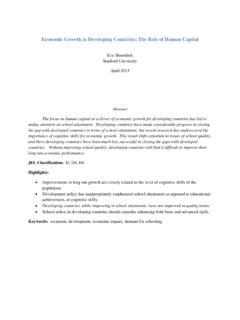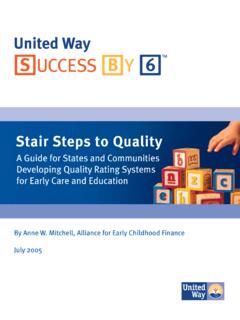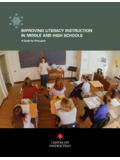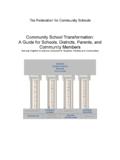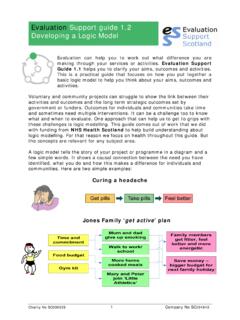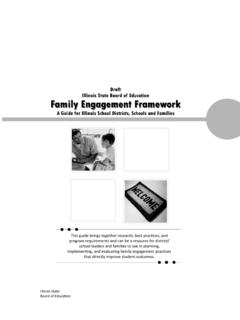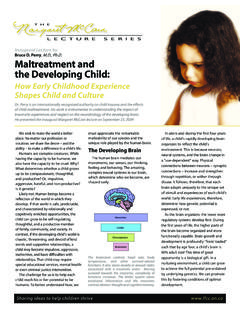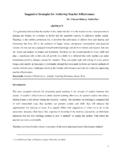Transcription of and school quality Economic outcomes - Eric …
1 Economic outcomes and school qualityEric A . Hanushek4 Education policy seriesInternational Academy of EducationInternational Institute for Educational PlanningThe International Academy of EducationThe International Academy of Education (IAE) is a not-for-profit scientific association that promotes educational research, its dissemination, and the implementation of its implications. Founded in 1986, the Academy is dedicated to strengthening the contributions of research, solving critical educational problems throughout the world, and providing better communication among policy makers, researchers, and practitioners.
2 The seat of the Academy is at the Royal Academy of Science, Literature and Arts in Brussels, Belgium, and its co-ordinating centre is at Curtin University of Technology in Perth, general aim of the Academy is to foster scholarly excellence in all fields of education. Towards this end, the Academy provides timely syntheses of research-based evidence of international importance. The Academy also provides critiques of research, its evidentiary basis, and its application to members of the Board of Directors of the Academy are: Erik De Corte, University of Leuven, Belgium (President); Barry Fraser, Curtin University of Technology, Australia (Executive Director); Monique Boekaerts, Leiden University, The Netherlands; Jere Brophy, Michigan State University, USA; Eric hanushek , Hoover Institute, Stanford, USA; Denis Phillips, Stanford University, USA.
3 Sylvia Schmelkes, Departamento de Investigaciones Educativas, following individuals, all Fellows of the Academy, are the members of the Editorial Committee for the Education Policy Booklet Series. Lorin Anderson, University of South Carolina, USA Eric hanushek , Hoover Institute, Stanford, USA T. Neville Postlethwaite, University of Hamburg, Germany Kenneth N. Ross, International Institute for Educational Planning, Paris, : 92-803-1279-0 The International Institute for Educational Planning The International Institute for Educational Planning (IIEP) was established in Paris in 1963 by UNESCO, with initial financial help from the World Bank and the Ford Foundation.
4 The French Government provided resources for the IIEP s building and equipment. In recent years the IIEP has been supported by UNESCO and a wide range of governments and IIEP is an integral part of UNESCO and undertakes research and training activities that address the main priorities within UNESCO s overall education programme. It enjoys intellectual and administrative autonomy, and operates according to its own special statutes. The IIEP has its own Governing Board, which decides the general orientation of the Institute s activities and approves its annual IIEP s mission is capacity building in educational planning and management.
5 To this end, the IIEP uses several strategies: training of educational planners and administrators; providing support to national training and research institutions; encourag-ing a favourable and supportive environment for educational change; and co-operating with countries in the design of their own educational policies and Paris headquarters of the IIEP is headed by a Director, who is assisted by around 100 professional and supporting staff. However, this is only the nucleus of the Institute. Over the years, the IIEP has developed successful partnerships with regional and international networks of individuals and institutions both in developed and developing countries.
6 These networks support the Institute in its different training activities, and also provide opportunities for extending the reach of its research /iiep /Education policy seriesEconomic outcomes and school quality IPrefaceEducation policy booklet seriesThe International Academy of Education and the International Institute for Educational Planning are jointly publishing the Education Policy Booklet Series. The purpose of the series is to summarize what is known, based on research, about selected policy issues in the field of series was designed for rapid consultation on the run by busy senior decision-makers in Ministries of Education.
7 These people rarely have time to read lengthy research reports, to attend conferences and seminars, or to become engaged in extended scholarly debates with educational policy research booklets have been (a) focused on policy topics that the Academy considers to be of high priority across many Ministries of Education in both developed and developing countries, (b) structured for clarity containing an introductory overview, a research-based discussion of around ten key issues considered to be critical to the topic of the booklet, and references that provide supporting evidence and further reading related to the discussion of issues, (c) restricted in length requiring around 30-45 minutes of reading time.
8 And (d) sized to fit easily into a jacket pocket providing opportunities for readily accessible consultation inside or outside the authors of the series were selected by the International Academy of Education because of their expertise concerning the booklet topics, and also because of their recognized ability to communicate complex research findings in a manner that can be readily understood and used for policy booklets will appear first in English, and shortly afterwards in French and Spanish. Plans are being made for translations into other languages.
9 Four booklets will be published each year and made freely available for download from the web site of the International Institute for Educational Planning. A limited printed edition will also be prepared shortly after electronic publication. Education polic y series 4 IIEconomic outcomes and school quality IIIThis bookletHuge sums of money are spent on education each year and there are those who ask if it really is necessary for people to have so much education. Although it would seem fairly self evident that education is required if the human capi-tal in a country is to be adequate for the Economic tasks re-quired of it, there has been widespread concern that more extensive evidence is required to support this booklet takes up the two-fold challenge of establish-ing the linkages between educational quality and national Economic productivity.
10 And then identifying those aspects of educational reform that are most likely to deliver en-hanced levels of educational booklet presents arguments in favour of improved teacher quality as the key pathway to improved student performance and offers sound advice concerning the planning and timeframe required to develop and evaluate progress towards a more effective teaching force. There are two critical elements in this discussion. First is the requirement for governments to experiment with al-ternative approaches to providing incentives for teachers including various forms of teacher compensation and teacher contractual is the need to recognise that one of the major impediments to school reform is the lack of regular infor-mation about what does, and does not, work.
